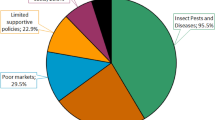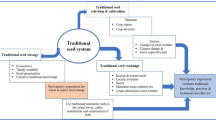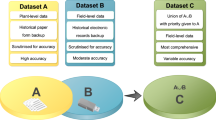Abstract
BARNES1 listed the dates of the first definite records of the sorghum midge, Contarinia sorghicola (Coq.), in various African countries as Sudan (1930), Nyasaland (1950), Uganda (1951), Aden Protectorate, Gambia, Kenya and Tanganyika (1952), Nigeria (1953). He suggested that these records probably reflect the fact that only in recent years have economic entomologists in Africa been able to turn their attention from cash crops to food crops, and that the midge was well established in these territories before it was first reported.
This is a preview of subscription content, access via your institution
Access options
Subscribe to this journal
Receive 51 print issues and online access
$199.00 per year
only $3.90 per issue
Buy this article
- Purchase on Springer Link
- Instant access to full article PDF
Prices may be subject to local taxes which are calculated during checkout
Similar content being viewed by others
References
Barnes, H. F., Gall Midges of Economic Importance, 7, 261 (Crosby Lockwood, London, 1956).
Matthee, J. J., and Oberholzer, J. J., Farming in S. Africa, 34, 17 (1958).
Author information
Authors and Affiliations
Rights and permissions
About this article
Cite this article
HARRIS, K. Sorghum Midge, Contarinia sorghicola (Coq.), in West Africa. Nature 192, 187–188 (1961). https://doi.org/10.1038/192187a0
Issue Date:
DOI: https://doi.org/10.1038/192187a0
Comments
By submitting a comment you agree to abide by our Terms and Community Guidelines. If you find something abusive or that does not comply with our terms or guidelines please flag it as inappropriate.



